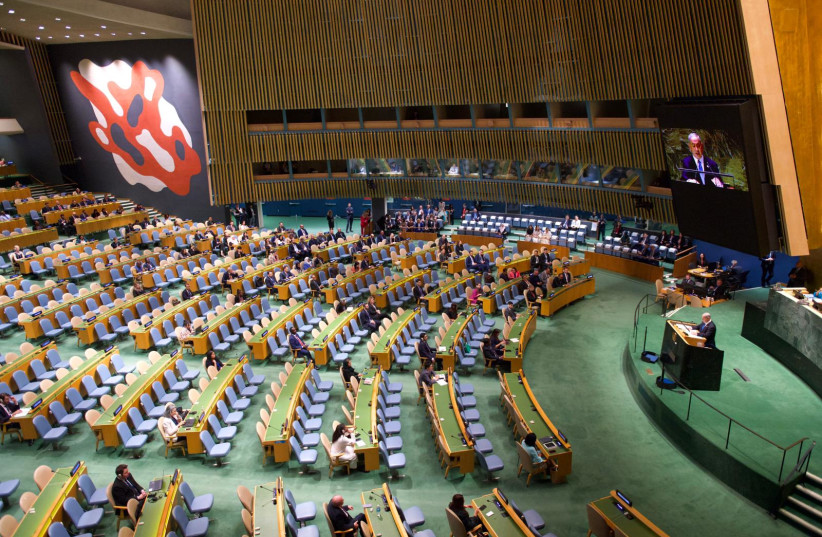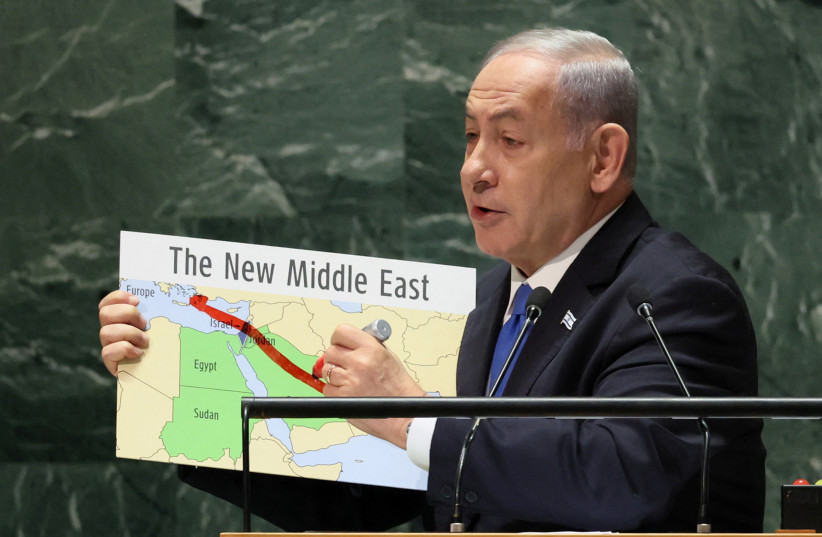Israel is on the verge of creating a peace with Saudi Arabia that could transform the Middle East as long as Iran’s nuclear threat is eliminated, Prime Minister Benjamin Netanyahu told the United Nations on Friday morning.
“We are at the cusp of” a “dramatic breakthrough: a historic peace with Saudi Arabia,” Netanyahu said as he stood before a mostly empty plenum during the high-level session that marks the opening of the 78th General Assembly.
“Such a peace will go a long way to ending the Arab-Israeli conflict. It will encourage other Arab states to normalize relations with Israel. It will enhance the prospects of peace with the Palestinians,” Netanyahu said.
On a global scale, he said, “It will encourage a broader reconciliation between Judaism and Islam between Jerusalem and Mecca between the descendants of Isaac and the descendants of Ishmael,” he added.
Netanyahu, long known for his reliance on props at the United Nations held up two maps of Israel and the region so that the audience could better understand the historic transformation that was about to occur.
The first showed a map from 1948, the year of the creation of the state when it was attacked by all its Arab neighbors which showed how Israel was alone in the region.

“Here's Israel in 1948. It's a tiny country, isolated, surrounded by a hostile Arab world. In our first seventy years, we made peace [only] with Egypt and Jordan,” Netanyahu said.
Then he held up a modern map that already reflected the change that occurred in 2020 when Israel normalized ties with four of its Arab neighbors under the US-backed Abraham Accords, as well as what could occur if Saudi Arabia joined that circle. He took out a red marker and drew a circle around those countries.
“The whole Middle East changes. We tear down the walls of enmity. We bring the possibility of prosperity and peace to this entire region,” Netanyahu said.
He recalled that he had used the same red marker at the UN plenum when highlighting the danger of a nuclear Iran.
“Today, today I bring this marker to show a great blessing… of a new Middle East, between Israel, Saudi Arabia and our other neighbors. We will not only bring down barriers between Israel and our neighbors.”
Netanyahu addressed his vision of a new peace to an almost empty plenum, while outside activists rallied against his judicial reform program.
It was the end of a week of intense diplomatic activity that marked his first trip to the United States since taking office at the end of December.
He arrived as US efforts were underway to forge a quadrilateral deal that would center on an agreement between Washington and Riyadh that would include a normalization deal between that Kingdom and Israel. In exchange, Israel would be expected to make concessions to the Palestinians.
Bloomberg has also reported that the US is considering a security pact with Israel as part of the deal.
The Saudi deal has been a major focus of Netanyahu’s trip, including his conversation on Wednesday with US President Joe Biden.
In an interview with Fox News, Saudi Crown Prince Mohammed bin Salman said that his country and Israel were closer than ever to a deal and that the engagement on the matter was serious.
Netanyahu: Palestinians must stop antisemitism, payment to terrorists
In his UN address, Netanyahu said “I believe we can achieve peace with Saudi Arabia with the leadership of President Biden.”
He added, “Working together with the leadership of Crown Prince Muhammed Bin Salman, we can shape a future of great blessings for all our peoples.”
Netanyahu’s belief that the normalization of Israeli-Arab ties should occur as the first step toward a resolution of the Israeli-Palestinian conflict has long stood at odds with the internationally accepted understanding that a two-state solution must be a pre-requisite to regional relations.
“For years, my approach to peace was rejected by the so-called experts,” Netanyahu said, adding that, “Well, they were wrong.”
“Under their approach, we didn’t forge a single peace treaty for a quarter century” until the 2020 Abraham Accords, Netanyahu said.
Prior to those accords, peacemaking efforts were based on the false premise that “unless we first concluded a peace agreement with the Palestinians, no other Arab state would normalize its relations with Israel,” Netanyahu explained.
“I’ve long sought to make peace with the Palestinians. But I also believe that we must not give the Palestinians a veto over new peace treaties with Arab states. The Palestinians could greatly benefit from a broader peace. They should be part of the process, but they should not have a veto over the process,” Netanyahu stated.

“When the Palestinians see that most of the Arab world has reconciled itself to the Jewish state, they too will be more likely to abandon the fantasy of destroying Israel and finally embrace a path of genuine peace with it,” Netanyahu said.
A new Palestinian-Israeli relationship, however, can not be based on “lies” and on the “endless vilification of the Jewish people,” Netanyahu said.
He pointed specifically to statements Palestinian Authority President Mahmoud Abbas made in August in which he said that Hitler killed the Jews during World War II because of their history with money lending and not because of antisemitism.
“Palestinian leader Mahmoud Abbas must stop spreading the horrible antisemitic conspiracies against the Jewish people and the Jewish state. He recently said that Hitler wasn’t an antisemite. You can't make this up. But he did. He said that.”
Netanyahu also took issue with the Palestinian Authority’s policy of providing monthly financial stipends to terrorists with blood on their hands as well as to their family members.
“The Palestinian Authority must stop glorifying terrorists. They must stop its ghoulish pay-to-slay policy of giving money to Palestinian terrorists for the murder of Jews. This is all outrageous,” Netanyahu said.
“For peace to prevail the Palestinians must stop spewing Jew-hatred and finally reconciliation themselves to the Jewish state.
“By that I mean not only to the existence of the Jewish state but to the right of the Jewish people to have a state of their own in their historic homeland, the Land of Israel,” Netanyahu added.
In addition to antisemitism, Iran’s pursuit of nuclear weapons and its support of global terrorism is the “fly in the ointment” when it comes to regional peace, Netanyahu said.
“Rest assured, the fanatics ruling Iran are will do everything they can to thwart this historic peace,” Netanyahu stated.
At home Iran has killed and arrested thousands of its own citizens and abroad it has used armed drones and its missile program to threaten its neighbors and has provided weapons to Russia for use against Ukraine, Netanyahu explained.
“Yet the regime’s aggression is largely met by indifference in the international community,” Netanyahu emphasized.
The international community must do more to support “the brave women and men of Iran who despise this regime and yearn for freedom, who've gone out bravely on the sidewalks of Tehran and Iran's other cities and face death,” Netanyahu said.
In light of Iran’s enrichment of uranium, he called for the international community to reimpose crippling sanctions against Iran as promised under the terms of the largely defunct 2015 Iran deal.
“Eight years ago, the Western powers promised that if Iran violated the nuclear deal, the sanctions would be snapped back,” Netanyahu stated.
“Well, Iran is violating the deal. But the sanctions have not been snapped back,” he explained, adding that,“To stop its nuclear ambitions, this policy must change.”
“Sanctions must be snapped back and above all, Iran must face a credible military threat,” Netanyahu said.
He pledged that “As long as I am prime minister of Israel, I will do everything in my power to prevent Iran from getting nuclear weapons.”
Netanyahu looks ahead to AI-related future threats
Looking ahead to future threats Netanyahu also asked the international community to do more to curb existential threats from artificial intelligence. To underscore the importance he places on the subject Netanyahu landed first in California upon his arrival in the United States so that he could discuss AI’s benefits and dangers with controversial billionaire Elon Musk, who is the CEO of Tesla and X.
Netanyahu told the UNGA that Israel was on the forefront of the AI revolution, as he warned that the world has “but a few years to adapt to the AI revolution.”
“The perils are great and they are before us: the disruption of democracy, the manipulation of minds, the decimation of jobs, the proliferation of crime and the hacking of all the systems that facilitate modern life,” Netanyahu stated.
“Even more disturbing, is the potential eruption of AI-driven wars that could achieve an unimaginable scale.
“Behind this perhaps looms an even greater threat, once the stuff of science fiction: that self-taught machines could eventually control humans instead of the other way around,” Netanyahu stated.
The international community must band together to “ensure that the promise of an AI utopia does not turn into an AI dystopia.
“I call upon world leaders to come together to shape the great changes before us, but to do so in a responsible and ethical way, he said.
“May we avoid the perils of AI by combining the forces of human and machine intelligence to usher in a brilliant future for our world, in our time and for all time,” he said.
Netanyahu's trip to the United States so far
Netanyahu, who met with Musk in California before departing for the East Coast, was met with resistance during his visit to NYC, as Jewish communities across the US gathered in Times Square to express their unwavering support for the Israeli leader, while other groups demonstrated their opposition to his policies.
Netanyahu has thus far met with a host of world leaders including Turkish President Recep Tayyip Erdogan, Ukrainian President Volodymyr Zelensky and US President Joe Biden, in a crucial meeting held on the sidelines of UNGA.
